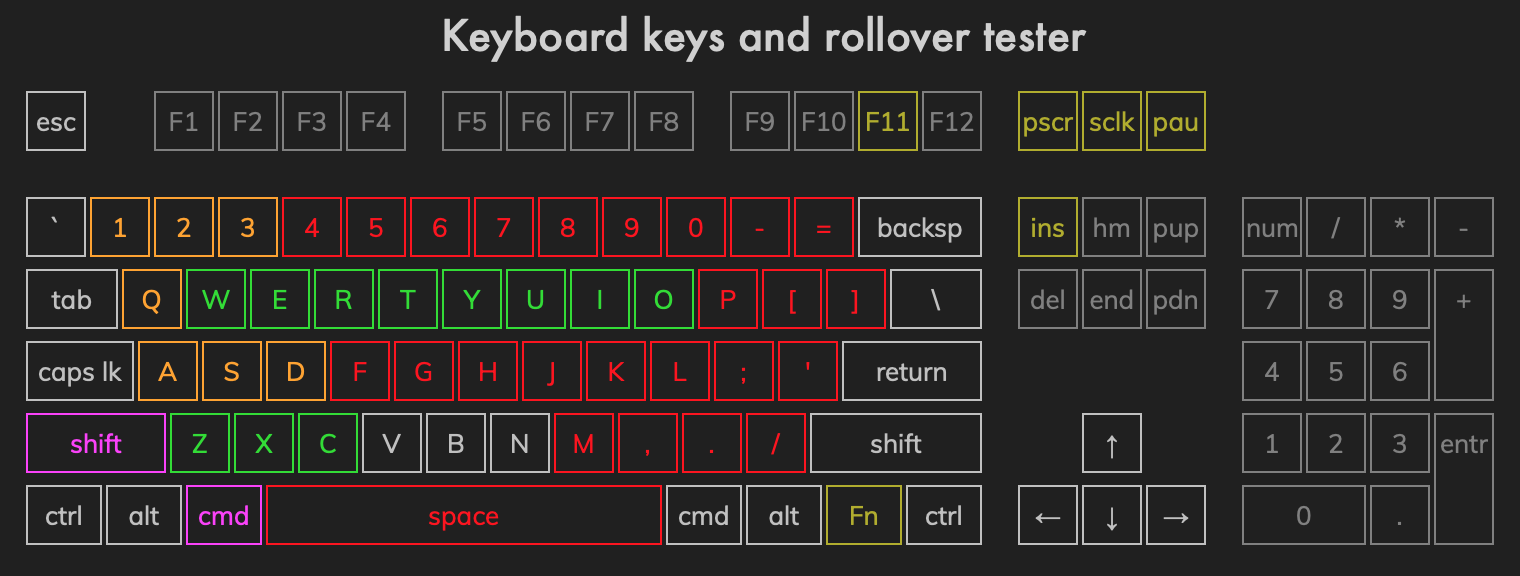
Vuurwerk blijft toch het leukst in slow motion.
Permalink - posted 2020-01-01
Fireworks is still best in slow motion.
Permalink - posted 2020-01-01
Vandaag is voor mij een bijzondere dag. Precies 20 jaar geleden ging ik op de eerste werkdag van het nieuwe millennium naar de Kamer van Koophandel om mij in te schrijven als eenmanszaak.
Met een paar kleine zijpaden richting Madrid en het ministerie van BZK is dit nog steeds het pad wat ik volg. Alleen is er één ding wat ik 20 jaar geleden niet zo goed gedaan heb: de keuze van mijn bedrijfsnaam.
Ik dacht: ik kies iets wat niet bestaat, dat is uniek en associëren mensen dus automatisch met mij. Aldus: Muada. Maar dat leidde alleen maar tot steeds uitleggen dat het toch echt niks betekent.
Vandaag is het dan zover: ik herlanceer mijn bedrijf met een nieuwe bedrijfsnaam en een nieuwe website. De naam is inet⁶ consult.
Als in: Iljitsch NETwerk CONSULTancy. En natuurlijk staat "inet" voor het internet. Alleen inetconsult.com was al weg. Dus: inet⁶ consult. inet6 is natuurlijk kort voor IPv6, niet geheel ontoepasselijk. Ook wil ik me focussen op zes onderwerpen:
Natuurlijk staat dit alles uitgelegd op de nieuwe website: www.inet6consult.com.
Permalink - posted 2020-01-03
The 2010s were the decade that we ran out of IPv4 addresses and the decade that IPv6 deployment got underway—but IPv4 is still going strong even without a fresh supply of addresses.
Here's an overview of what happened with IPv4 and IPv6 in the 2010s.
Read the article - posted 2020-01-08
De jaren '10 van de 21e eeuw waren het decennium dat de IPv4-adressen opraakten en het decennium dat IPv6-adoptie op stoom begon te komen, maar IPv4 toont nog geen tekenen van omvallen zonder toevoer van verse adressen.
Hier is een overzicht van wat er gebeurd is met IPv4 en IPv6 in de jaren 2010.
Read the article - posted 2020-01-08
A few days ago I ran into this blog post from 2012: Deprecate, Deprecate, Deprecate, which lists a bunch of IPv6 stuff that's been "deprecated" by the IETF. That means: we changed our minds about this protocol or feature, stop using it.
Read the article - posted 2020-01-13
As of a few days ago, IPv4 has run out in all regions in the world, as AFRINIC, the Regional Internet Registry that serves Africa, has now reached IPv4 exhaustion phase 2.
For more on the IPv4 exhaustion over the last decade, see my story The rise of IPv6 and fall of IPv4 in the 2010s.
Read the article - posted 2020-01-16
Met ingang van een paar dagen geleden is IPv4 nu op in alle regio's van de wereld nu AFRINIC, de Regional Internet Registry die Afrika bedient, IPv4 exhaustion phase 2 bereikt heeft.
Zie mijn verhaal De opkomst van IPv6 en ondergang van IPv4 in de jaren 2010 voor meer over het opraken van IPv4 de afgelopen tien jaar.
Read the article - posted 2020-01-16
We moeten niet het succes van IPv6 afmeten aan in hoeverre IPv6 IPv4 vervangt, maar in hoeverre IPv6 IPv4 aanvult. En dat doet het al heel aardig op dit moment door IPv4aaS (IPv4 as a service) mogelijk te maken. En IPv4aaS zal ervoor zorgen dat ISPs IPv6 gaan eisen voor peering met streamingdiensten en andere grote contentaanbieders.
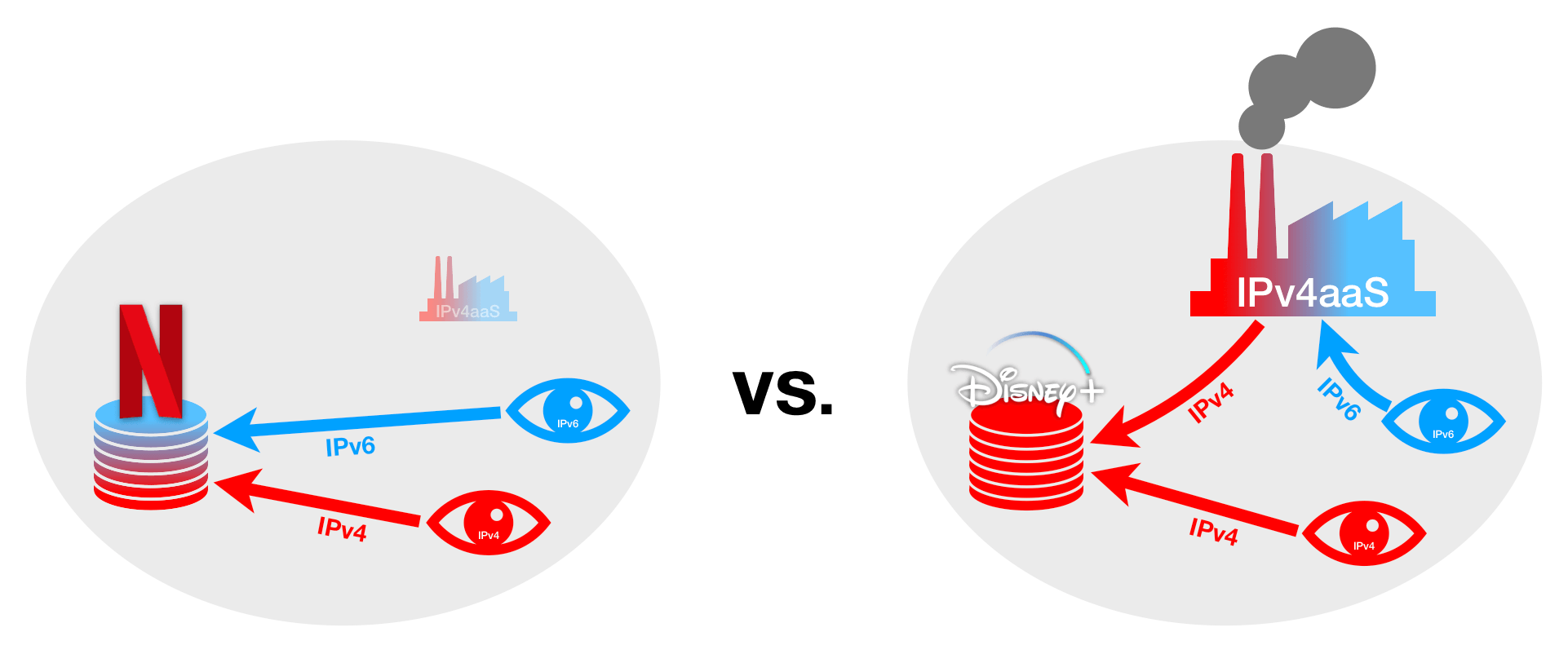
Read the article - posted 2020-01-23
We shouldn't gauge the success of IPv6 by looking at how much IPv6 replaces IPv4, but by how much IPv6 complements IPv4. And it's already doing that quite well today by making IPv4aaS (IPv4 as a service) possible. And IPv4aaS will make ISPs require IPv6 when peering with streaming services and other big content providers.

Read the article - posted 2020-01-23
At my first job back in 1992 I had three things on my desk: a big phone, a 486SX PC running Windows 3.0 and a DEC VT320 terminal. Even back then those were pretty outdated, but we still used them for our helpdesk ticket system and our in-company email. (By the way, I recommend that everyone in tech starts as a helpdesker.) Five years later, I started a company with four others, and the first business we did was collect a bunch of VT420 terminals, which we then sold for ƒ 25,- a piece. I kept one for myself.
So the Digital VT100 terminal family holds a special place in the retro tech corner of my heart. Over the years, I tried to connect the terminal to my Mac using a USB-to-serial converter a few times, but never got anywhere. Today, I tried again, and finally got everything to work.
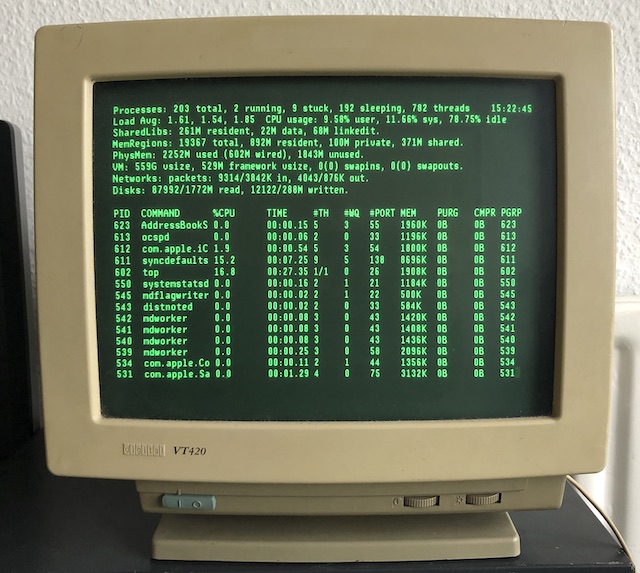

Image link - posted 2020-01-31
Today, I got a new USB-to-serial adapter. When trying to figure out how to connect a DEC VT420 terminal to a Mac, I learned that as of version 10.9, MacOS has a built-in driver for the FTDI USB-to-serial chip. So I ordered a "USB-console cable" from Amazon. This is a cable that looks a lot like a Cisco console cable but with a USB connector at one end. As the name suggests, you can connect it directly to the console port of a Cisco router. And with the right RJ-45-to-DB-25 / DB-9 adapters, you can connect it to anything with a serial port.
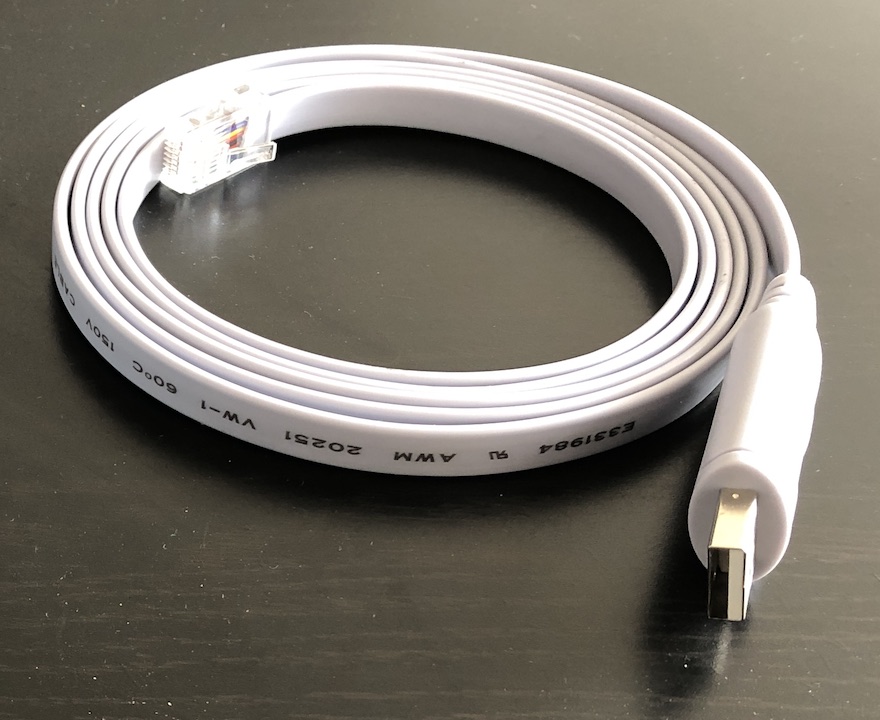
For 2020, there will be hands-on BGP training courses in association with NL-ix on the following dates:
In 2020 zijn er BGP hands-on trainingen in samenwerking met NL-ix op de volgende dagen::
Er zijn nu 22 landen met meer dan 100 gevallen van COVID-19 en acht landen met meer dan 1000. In China en Italië, de hardst geraakte landen, werd het virus in eerste instantie onderschat en daarna waren er zeer zware maatregelen nodig, in China op het draconische af. De ziekenhuizen daar zijn of waren zwaar overbelast, wat ongetwijfeld tot extra doden leidt of geleid heeft.
Het zou wel zo fijn zijn als wij het in Nederland en andere landen met een nog redelijk overzichtelijk aantal gevallen niet zo ver laten komen. Liever stevige maatregelen nu dan draconische over één of twee weken.
Read the article - posted 2020-03-11
This is a post that I wrote for the Noction blog:
Like other very successful protocols such as HTTP and DNS, over the years BGP has been given more and more additional jobs to do. In this blog post, we’ll look at the new functionality and new use cases that have been added to BGP over the years. These include various uses of BGP in enterprise networks and data centers.
Recently, I've been looking a bit at BGP in datacenters, and it's really interesting to see how BGP is used in such different ways than it is for global inter-domain routing.
Read the article - posted 2020-03-23
There's an episode of the TV show Friends where Chrissie Hynde has a guest role. Phoebe feels threatened by her guitar playing, and asks her "how many chords do you know?" "All of them."
Wouldn't it be cool if you could give the same answer when someone asks "how many programming languages do you know?"
But maybe that's a bit ambitious. So if you have to choose, which program language or programming languages do you learn?
Read the article - posted 2020-04-01
Back in 2013, I wrote a blog post about archiving. In it, I compared the costs per terabyte (and the weight per terabyte) of several ways to store data for archival purposes. When I read Beyond Time Machine: 5 Archiving over at The Eclectic Light Company blog, I realized that it’s time revisit this topic.
Read the article - posted 2020-04-19
Two weeks ago, I ordered a Mac Mini, my first desktop computer in 20 years. This is sort of a review of the Mac Mini, but I reserve the right to digress.
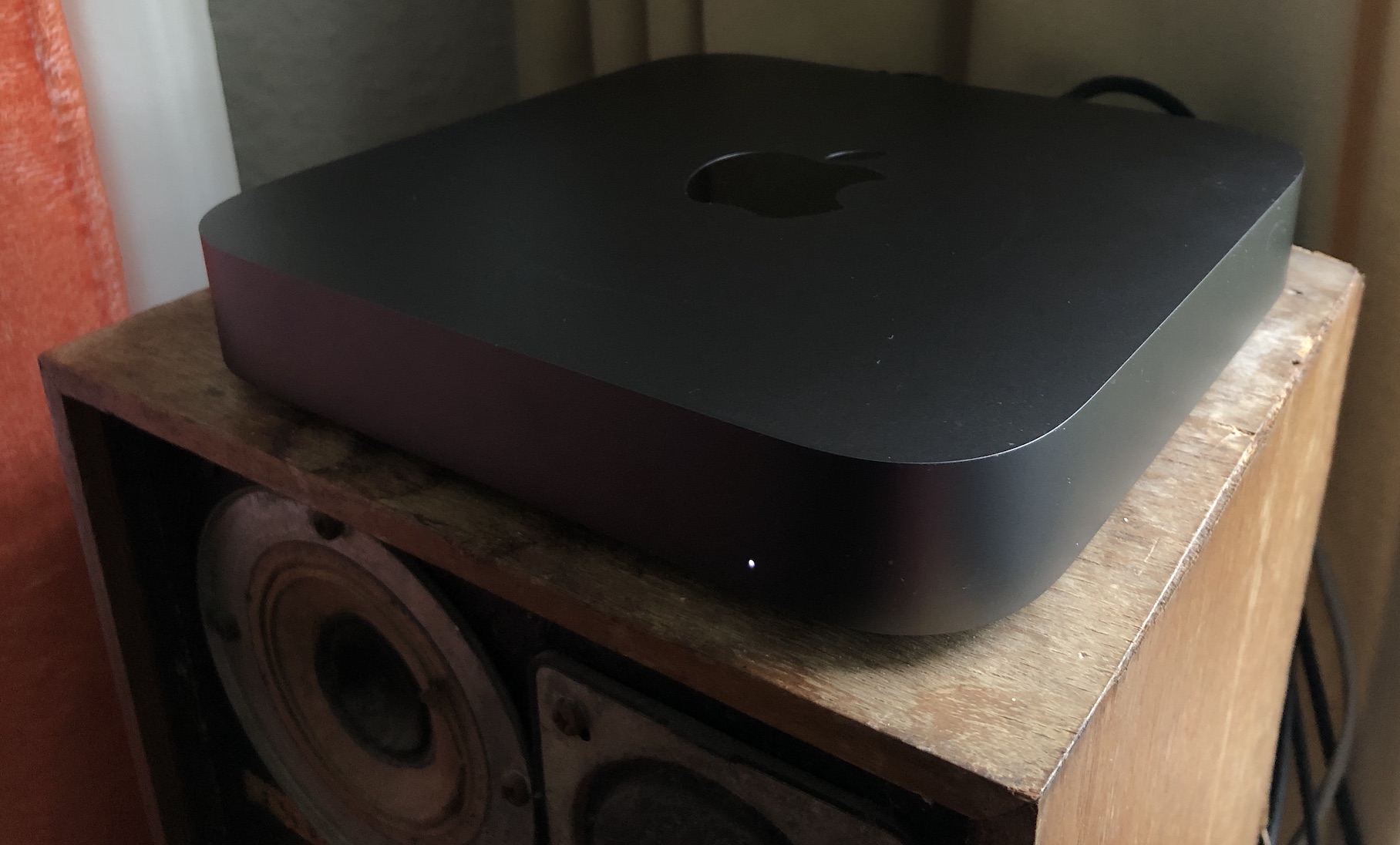
Recently, Cloudflare launched Is BGP safe yet?. And they immediately answer their own question: No.
What they're getting at is RPKI deployment. RPKI is a mechanism that lets the owner of a block of IP addresses specify which network gets to use those addresses. (Which AS gets to originate a prefix, in BGP speak.) RPKI protects to some forms of (mostly accidental) address hijacking. But for RPKI to work, the address owner needs to publish a "route origination authorization" (ROA) and networks around the globe need to filter based on these ROAs.
Five years ago, I wrote that RPKI is ready for real-world deployment. So where are we now? The US National Institute of Standards and Technology (NIST) has a very nice RPKI deployment monitor, showing the following graph:
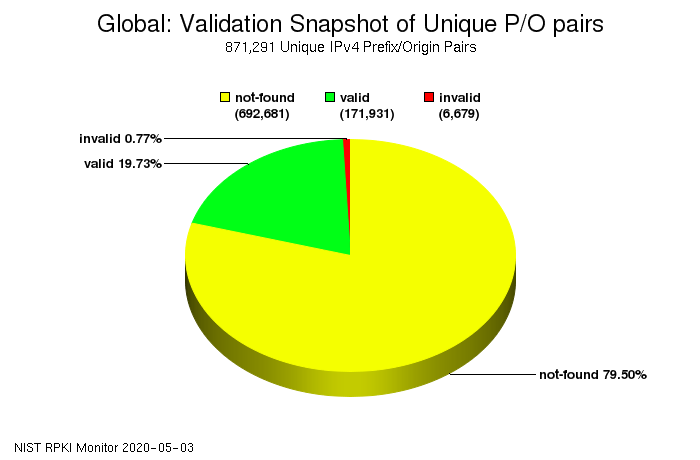
Twee weken geleden kwam het Planbureau voor de Leefomgeving (PBL) uit met een rapport over het gebruik van biomassa. Degenen onder ons die gehoopt hadden op een solide doorrekening van het fenomeen en een duidelijke conclusie voor of tegen werden zwaar teleurgesteld. In plaats daarvan werd de noodzaak tot het gebruik van biomassa voor de Nederlandse energievoorziening als uitgangspunt aanvaard, en daarna alleen gekeken of het mogelijk was hierover een polder-consensus te bereiken. (Spoiler: niet dus.)
In een toelichting in het radioprogramma Met het oog op morgen zegt auteur Bart Strengers zelfs (rond 7:25):
Als we de aarde niet meer dan anderhalve graad willen laten opwarmen, hoe gaan we dat dan doen? En als je biomassa uitsluit, dan moet je dat dus doen op andere manieren. Het punt is dat je dan dus heel snel uitkomt op scenario's waarin je zegt dan mogen we niet meer vliegen, dan mogen we geen vlees meer eten...
Alleen gaat biomassa ons op papier wel helpen het doel van maximaal 1,5 graden opwarming te halen, maar in praktijk niet.
Read the article - posted 2020-05-21
Back in 2006, Bianca Ryan sang Why Couldn't It Be Christmas Every Day?
Turns out when it comes to IPv6 adoption, it is Christmas every day now:
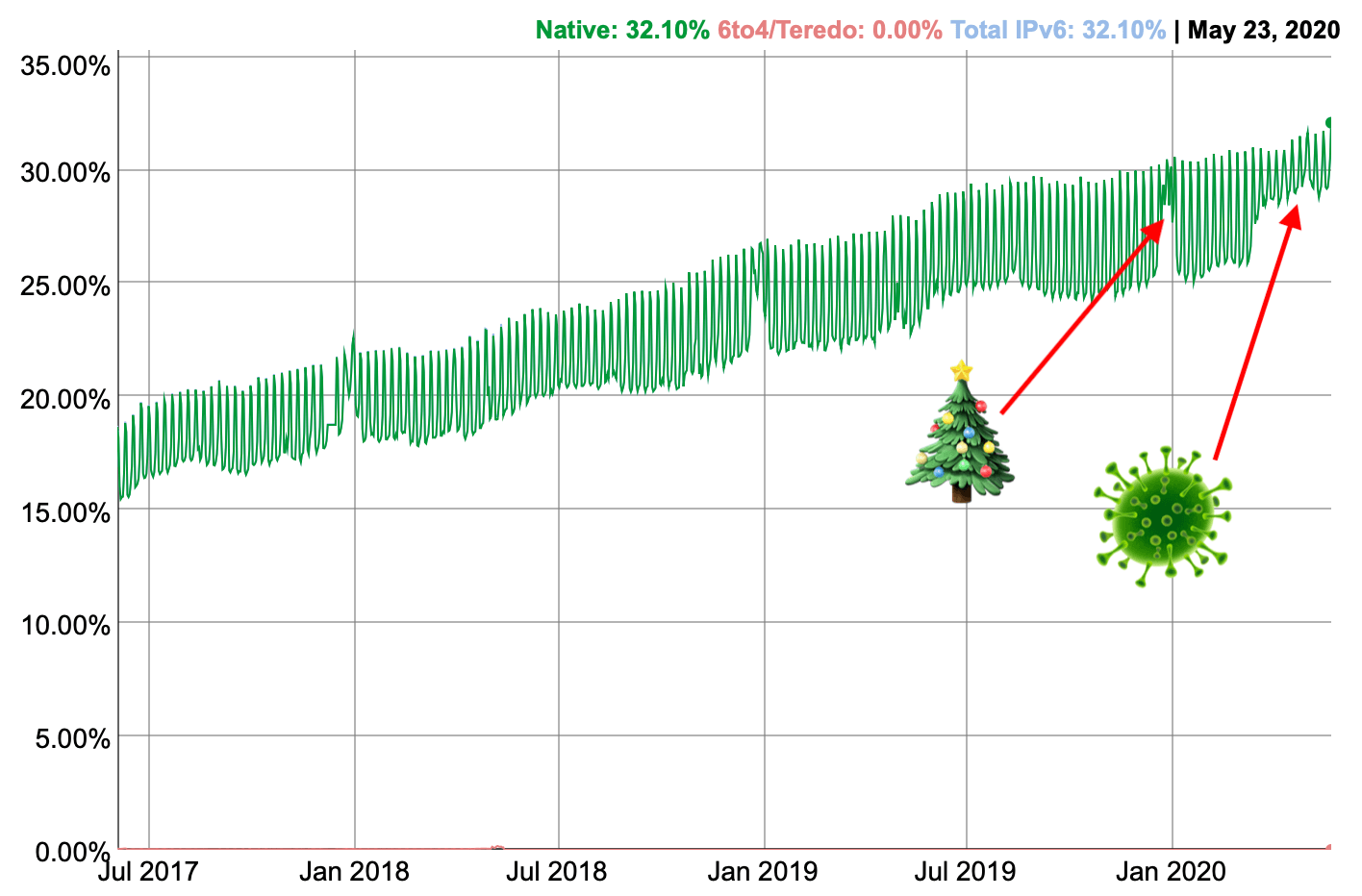
Google's IPv6 statistics show that during the week, IPv6 adoption is about 5% lower than during the weekends, as apparently, more people have IPv6 at home than at work. Around Christmas, the minimum goes up while the maximum stays about the same.
In this regard the COVID-19 lockdown means it's Christmas every day: between December 20 and January 5, IPv6 adoption didn't drop below 27%. Between January 6 and March 13 there was no work day IPv6 adoption reached 28%, but since March 23, work day IPv6 adoption never dipped below 28%.
Permalink - posted 2020-05-25
Next Monday June 8, 2020, 8 years and 2 days after World IPv6 Launch, the RIPE NCC is organizing a RIPE NCC::Educa online education event about running IPv6-only.

Halfway through the morning (European time) I'll be talking about IPv6 address planning, based on my experiences with IPv6 numbering plans (see my publications).
At the end of the event, I'll be participating in a panel discussion with Nico Schottelius and Veronica McKillop titled "When can we turn off IPv4?"
Go to the RIPE website for more information and to sign up.
Read the article - posted 2020-06-02
These are my slides from my IPv6 address planning presentation at the online RIPE NCC::Educa IPv6-only event.
Permalink - posted 2020-06-08
There have been rumors that Apple will transition the Mac from Intel CPUs to ARM CPUs designed by Apple itself have been around for some years, and now they've come to a head: apparently, Apple will announce the transition at their WWDC conference a week and a half from now.
Read the article - posted 2020-06-12
In the 18 years from 2002 to 2019 I attended 9 RIPE meetings, 1 LACNIC meeting and 16 IETF meetings in 20 cities and 10 countries on 3 continents. Here are a few random photos from each meeting or city.
You may notice camera improvements over time. 😃
Read the article - posted 2020-06-16
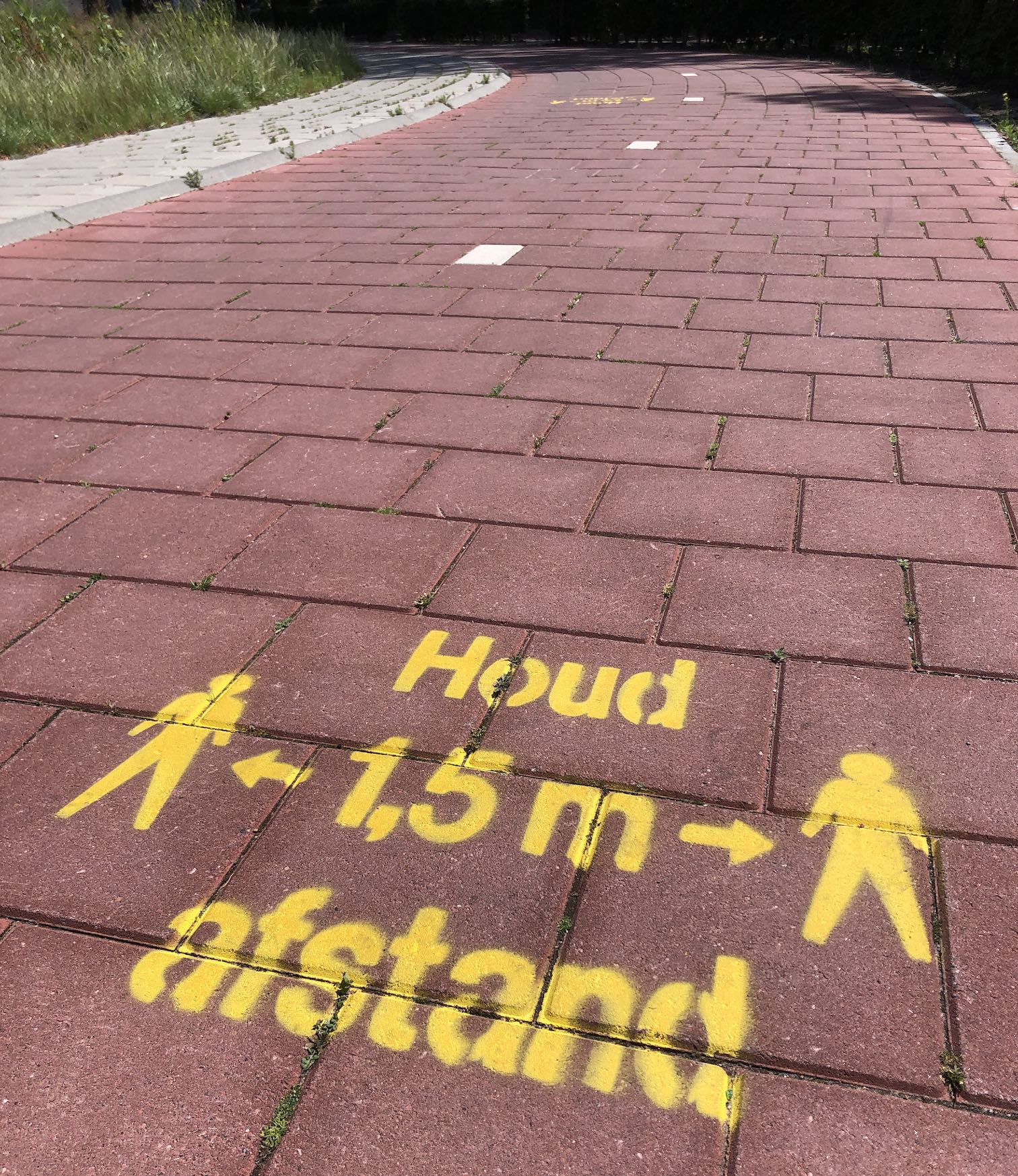
Image link - posted 2020-06-28
In 2009, I started an effort to digitize all my cassette tapes. As my last computer that still has a line in port is facing retirement, I decided to finally finish that project. Perhaps more about this later. Turns out some of these old cassettes have weird things on them, including radio broadcasts that contain computer programs.
Read the article - posted 2020-07-04
In 2009 begon ik al mijn oude cassettebandjes te digitaliseren. Nu mijn laatste computer die nog een audio lijn-in poort heeft aan z’n pensioen toe is leek me dit het moment om dat project af te ronden. Misschien meer daarover op een later moment. Het blijkt dat er op sommige van die oude cassettes nogal vreemde dingen staan, inclusief radiouitzendingen met computerprogramma’s.
Lees hieronder hoe ik de Hobbyscoop jubileum-beeldkrant op een 31 jaar oude cassette wist te runnen op een moderne computer.
Read the article - posted 2020-07-04
After my BASICODE adventures a few days ago, I really wanted to see if I could run a BASICODE game on my VT420 terminal.
Read the article - posted 2020-07-06
Earlier this week, I read that there's a comet that's visible. It's called C/2020 F3 (NEOWISE), but I'll call it Neowise for short, after the space telescope that found it.

It was reasonably clear again yesterday night, so I tried shooting the comet from my balcony, which worked pretty well despite the two streetlights illuminating the camera:
I then went to a dark place just outside the city, and took this shot:
The blue in the first photo is probably due to the auto white balance taking some foreground that I cropped out into account. Soon after I started shooting, mist came rolling in, which may explain that the detail wasn't better in the second shot.
Apart from that, the comet head clearly looks greenish here (click on the second photo to see a larger version), and the comet has moved a surprising distance between the first shot at 0:09 and the second at 1:37.
Same 105 mm f/2.8 macro lens wide open, ISO 1000 for the first shot, ISO 1600 for the second.
Permalink - posted 2020-07-19
Deze week kreeg ik de jaarafrekening voor mijn energieverbruik. Gasverbruik het afgelopen jaar was 275 m³. De kosten hiervan zijn verbazend ingewikkeld opgebouwd, maar het komt erop neer dat van de € 381,48 die ik betaalde € 168 vaste kosten waren en € 213 voor de 275 kubieke meter gas. Was ik een gemiddelde appartementsbewoner geweest (875 m³ per jaar) dan zou ik 465 euro meer betaald hebben.
Wat ik me afvroeg is wat het gaat betekenen wanneer ik van het gaf af moet (of wil)...
Read the article - posted 2020-08-08
In de eerste zes maanden van dit jaar zijn er wereldwijd 10 miljoen mensen positief getest voor het SARS-CoV-2 virus. De volgende 10 miljoen duurden zes weken. In Nederland werd op 14 maart de "intelligente lockdown" afgekondigd. Die dag werden 155 mensen positief getest. De afgelopen week waren dat er ruim 600 per dag, vier keer zoveel.
Het slechte nieuws: het virus neemt toe middenin de zomer, wanneer scholen en universiteiten dicht zijn en luchtwegvirussen normaliter nagenoeg niet voorkomen. De overheid kondigt geen nieuwe maatregelen af en handhaaft de bestaande nauwelijks. Iedereen gaat losser met de maatregelen om, sommigen een beetje, anderen veel losser, en sommige mensen negeren de regels totaal. Er zijn zelfs mensen die zich laten testen (en dus een reden hebben om te denken dat ze besmet kunnen zijn) maar daarna naar hun werk gaan voordat ze de uitslag hebben. Van je collega's moet je het hebben.
Grafiek van het aantal SARS-CoV-2 besmettingen per dag in Nederland:
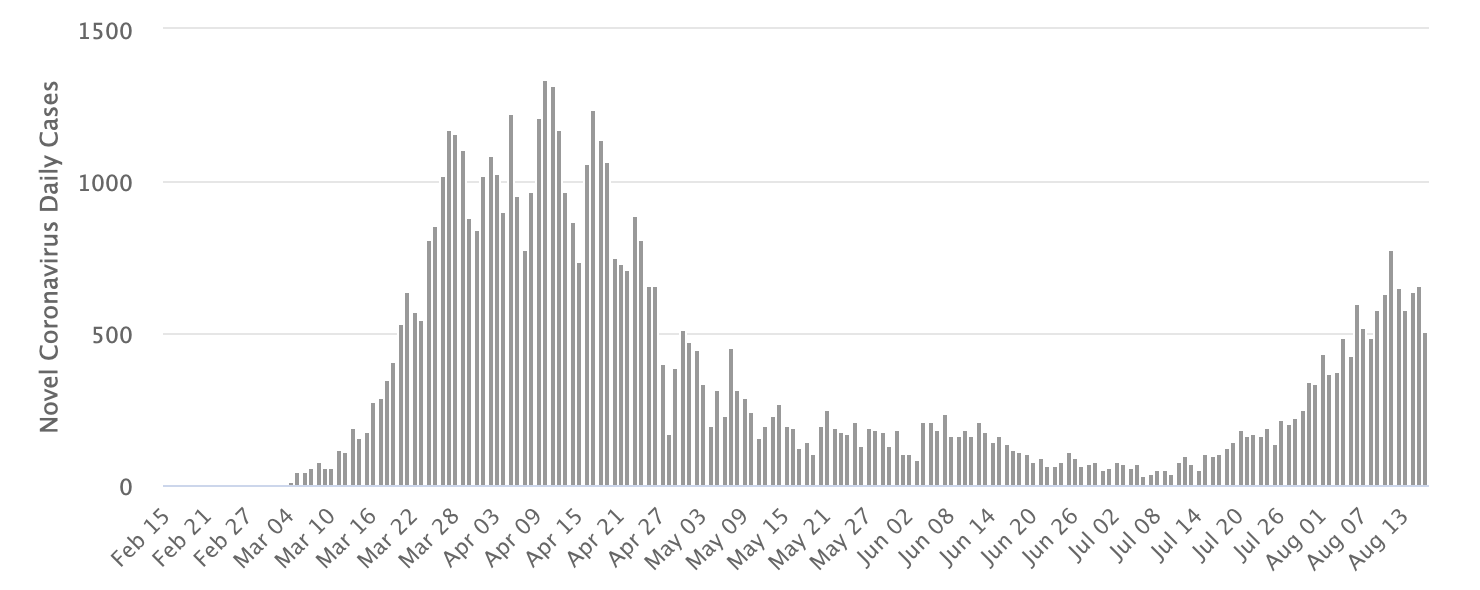
Gelukkig is er ook goed nieuws...
Read the article - posted 2020-08-17
I recently got more interested in cooking, so I started looking for recipes on the internet. Then I found out that in the US, it's customary to list the amounts for many ingredients in teaspoons, tablespoons and cups, in addition to using pounds, pints, quarts and two types of ounces.
So I decided to make this page that will let me (and you) convert between these different measurements and the units the rest of the world understands: milliliters and grams. I wanted to make this easy so you could do it on the go on a phone or a tablet while cooking, hence the sliders rather than having to type in numbers.
This was the first time I used Javascript for a significant amount of functionality, and that was actually relatively easy.
Read the article - posted 2020-09-05
In this post, I want to look at different ways of running an emulated Commodore 64 (or Commodore 128) and how they compare. The contenders are the THEC64 Mini, a half-size recreation of the C64 powered by an ARM CPU running an emulator, the full-size THEC64 that adds a working keyboard and the VICE emulator running on my MacBook Pro.
In a previous post, I mentioned that it's hard to connect a Commodore 64 to currently available monitors and TVs. I've also had considerable difficulty hooking up my Amiga 1200 to an LCD monitor and getting a clear picture. Probably more about that in a later post.
So I thought it would be interesting to look at how widely available computers since the late 1970s have sent text and graphics to an external display, and the evolution of those systems.
Home computers from the 1980s were intended to be used with a TV as their display.
So as of the second half of the 1990s, all common computer types moved away from TV-based display options towards a common display technology. Then, with the advent of HDTV, TV also made the jump to higher resolutions and digital connections... and now it is again possible to use a TV as a computer display.
Funny how things work out sometimes.
Read the article - posted 2020-09-13
After talking about the complexities involved with connecting older computers to newer displays, I was in the mood for a success story.
This is how I finally figured out how to get a decent looking picture from my Amiga 1200 on a Dell U2312HM monitor using a simple Amiga-to-VGA adapter (or cable).
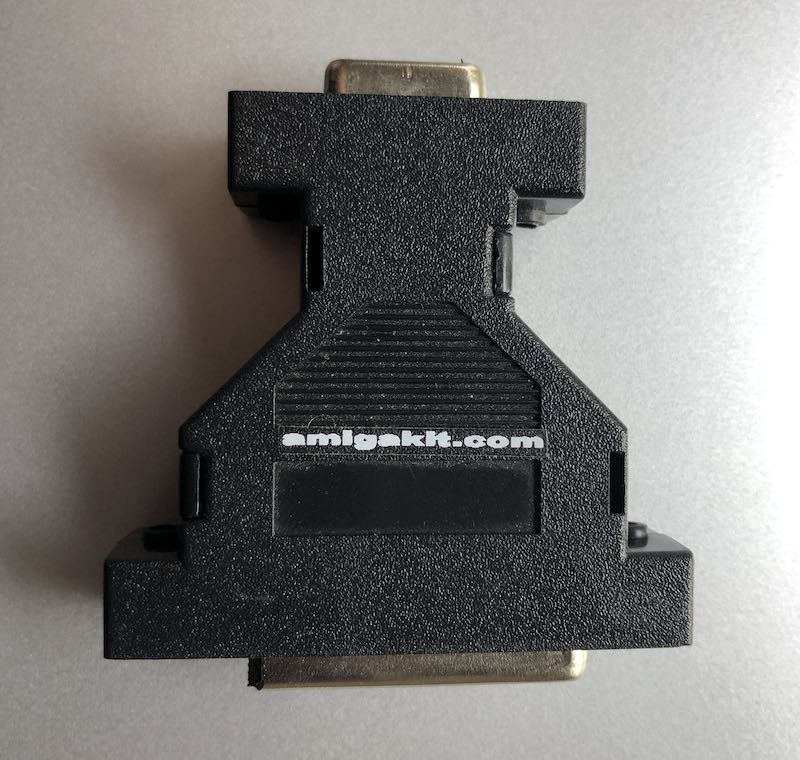
This is the adapter I'm talking about. It has the Amiga 23-pin video connector on one end and a standard VGA connector at the other end. There's no electronics inside, it really only allows for connecting a VGA cable to the Amiga; it's up to the Amiga to generate a video signal that the monitor will understand.
Read the article - posted 2020-09-16
This is a review of the recently released Indivision AGA MK3, which is basically what Amiga people know as a "flicker fixer". More specifically, the Indivision MK3 lets you use pretty much any VGA or HDMI monitor or TV as a display for your Amiga 1200. (It's also available for the A4000T.)

I got an Amiga 500, a 1200 and a 3000 within a few years in the early 1990s. I'm not sure what happened with the 500, but I still have the 1200 and the 3000. I've used the Amiga 1200 for quite a bit the past week, which got me thinking: what should I do to prepare my 27-year-old computer for the next decade of her life? Or, more in general, what's appropriate for different kind of Amigas to keep them running for the foreseeable future?
In order to enjoy your Amiga, you have to be realistic in what you can expect from which model, and which upgrades make sense and which don't. In addition, there's three related issues to pay attention to: storage, backup and communication. I'll go over this for all the mainstream Amiga models: 1000, 500, 2000, 3000, 600, 1200 and 4000.
Read the article - posted 2020-09-26
The last few weeks I've been spending some time with my Amiga 1200 and Amiga 3000, and I want to write about some of that. However, I don't want to spend too much of my own time and that of the readers of this blog on that. So my plan is to do a collection of short takes periodically. This will be the first one. Topics:
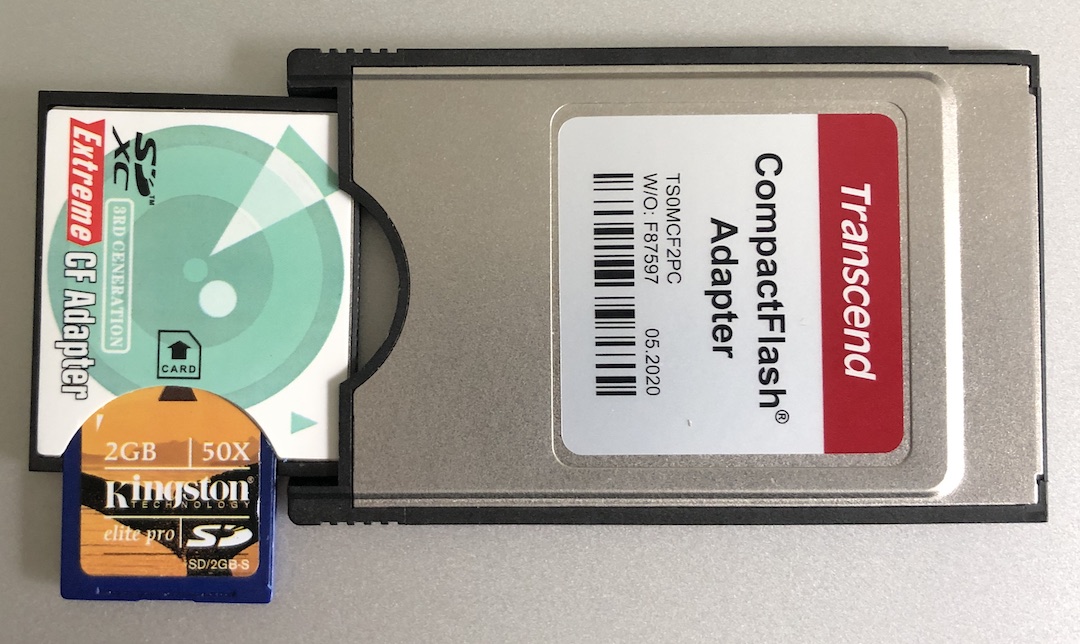
Het grootste deel van de jaren '90 draaide het HCC Commodore Amiga BBS op een Amiga 3000 in mijn huiskamer. Op BBS'en konden mensen berichtjes uitwisselen en bestanden downloaden voor het internet voor het grote publiek doorbrak.
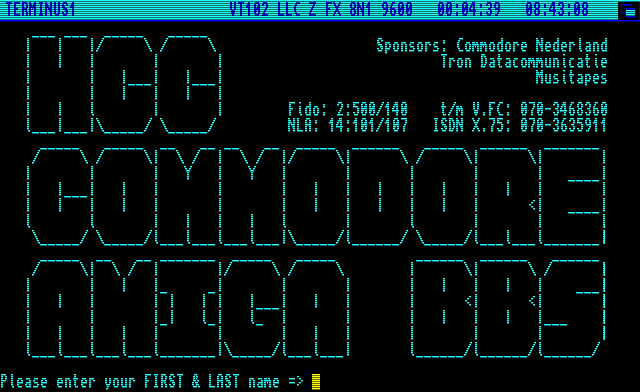
Nieuwsgierig hoe dat ging? Ik heb hier alle bestanden die op het BBS stonden/staan neergezet, wat mij een laagdrempelige manier leek om een idee te krijgen van het hoe en wat van het BBS destijds. En mocht je nog een Amiga hebben, dan kan je er wellicht nog iets leuks te downloaden vinden. Het is "maar" 250 MB, maar de downloads zijn wel met zorg bij elkaar gezocht.
Read the article - posted 2020-10-12
I've been on an Amiga upgrade spree recently. So I thought I'd go over all of them, possibly providing some inspiration or caution to my readers. Apologies in advance for this short take being not very short. Topics:
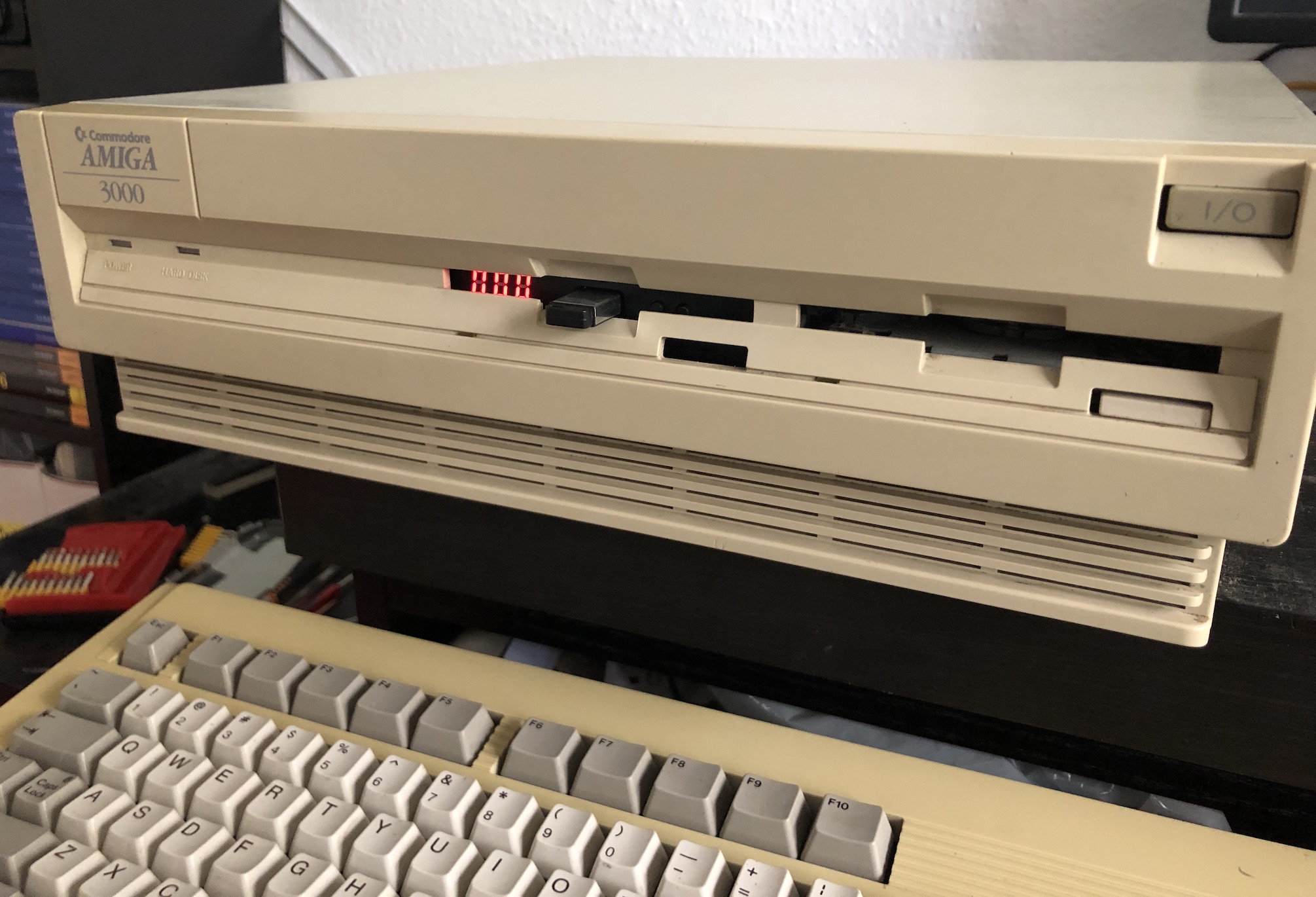
Last week, I wrote about upgrading my Amiga 3000, where I mentioned that the Amiga 3000's boot ROMs don't recognize the Buddha card. Turns out, that can be fixed.
Read the article - posted 2020-10-31
Upgrading my Amiga 1200: 68060 CPU, memory, a new power supply, a CF card as the HDD, but mostly networking and trying different ways to get a wireless mouse to work with the Amiga, eventually succeeding with the RapidRoad USB adapter.
Read the article - posted 2020-11-01
A while ago, we discovered that there is no one perfect programming language. But is there one perfect sorting algorithm? I started thinking about that after seeing this Youtube video: The Sorting Algorithm Olympics - Who is the Fastest of them All. You may want to watch it first before continuing to read this post, as I'm going to give it away in the article.
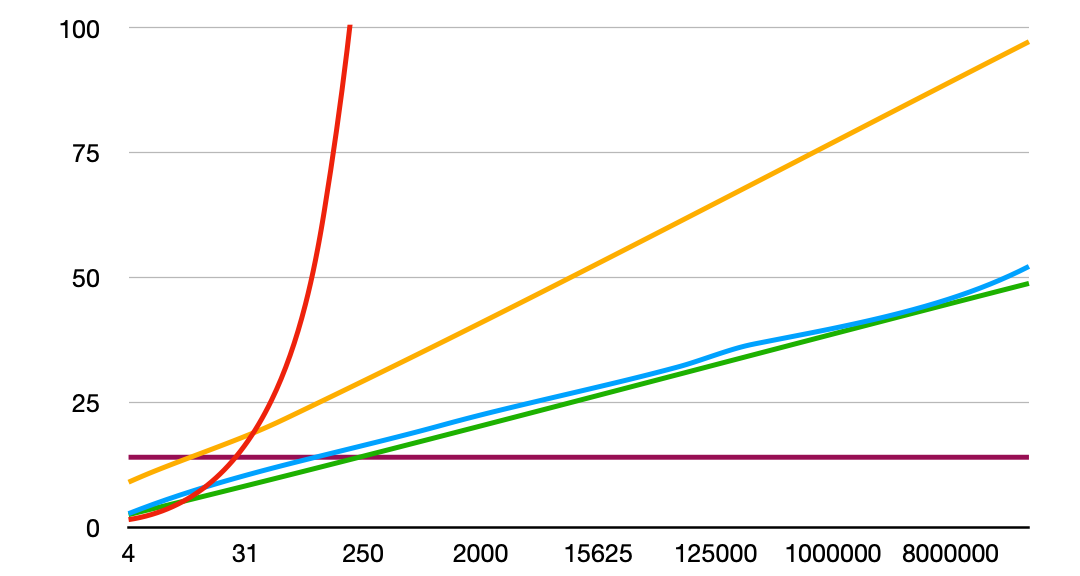
Read the article - posted 2020-11-22
An article I wrote for the Noction blog looking at possible attacks using the BGP community attribute.
A while ago, RIPE Labs published the two-part article BGP Communities – A Weapon for the Internet. That may have been a bit of a shock for those of us making good use of BGP community attributes as an important tool in our BGP arsenal.
Conclusions:
This community-based attack is definitely something we need to be prepared for and defend against. But does this warrant considering BGP communities “a weapon for the internet”? That seems a bit extreme.
But:
Treat your BGP communities with respect, you don’t want to encounter their dark side.
Read the article - posted 2020-12-07
It's interesting to see how much has stayed the same over 40 years, and also how some keys have been moved around, as well as the differences between Apple's keyboards and the standard PC keyboard.
So I drew the layout of 18 keyboards to easily compare IBM, Apple, Digital, Sun, Amiga, Atari and third party keyboards over the years.

Read the article - posted 2020-12-17
Last week I recorded a remote guest lecture about IPv6 for the Computer Networks course at the Hochschule Augsburg with Rolf Winter. It's a 63 minute Youtube video, with mostly me talking about IPv6 and Rolf interjecting with questions now and then. Have a look over at Youtube.
And these are my slides.
Read the article - posted 2020-12-22
I have a new mechanical keyboard on order, which lets you hot swap the keyboard switches. When you do that, it's a good idea to do a quick test to see if all the keys still work. There are many tools to do this, but I decided to make my own web-based one. I think it came out pretty nicely.
